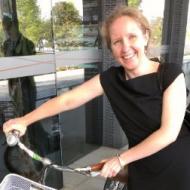Gayle is passionate about the powers of persuasion that can be used to help people realise their role in achieving a sustainable future. She brings 25 years’ experience applying behavioural science solutions for conservation and environmental impact. After working as a behaviour change lead in sustainable development NGOs, Gayle has worked at IUCN (International Union for Conservation of Nature)/TRAFFIC since 2011. In her role, she directs a portfolio of work applying social and behavioural science to ensure wildlife trade is not a threat to the conservation of nature. Through this role Gayle has lived and worked in Asia, but now resides in the UK and works internationally.
Initiatives Gayle leads include: a two-year Technical Support Program on Behaviour Change for the 30+ countries implementing wildlife conservation for sustainable development objectives under the World Bank-GEF Global Wildlife Program (GWP); engagements under the Convention on International Trade in Endangered Species (CITES) reducing demand for over-exploited taxa; and a range of national social and behaviour change (SBC) interventions, cited as evidence of both the need and effectiveness of behaviour change approaches to conservation challenges, in publications such as the Dasgupta Review into the Economics of Biodiversity. Project aims include to influence consumer purchasing preferences in East Asia (e.g. ivory in China) and Southeast Asia (e.g. Reducing Demand for Wildlife, tiger parts in Thailand and consumption of wild meat); to support governments in Latin America to reduce demand for illegally traded species; to gain social and psychological insight into wildlife trade offenders (e.g. poachers in South Africa); to combat wildlife crime corruption (e.g. here); to increase enforcement effort and effectiveness (e.g. for timber); to promote reduction of zoonotic risk and safer, more sustainable wildlife end-markets (e.g. here); and to catalyse and inform conservation community best practice (e.g. through online courses, research communities, conferences and briefing papers).
Gayle has published extensively, with examples including official Guidance for Parties implementing the Demand Reduction Resolution under CITES; papers published in Nature: Human Behaviour; a chapter on changing the behaviour of Pangolin product consumers in an Elsevier publication on the species; the IUCN report on rhinoceros trade for CITES CoP19; Powers of Persuasion, adopted by OECD as an Official Document at the High-Level Forum on Risk during the 5th Task Force Meeting on Countering Illicit Trade; and Research Analysis produced with Imperial College, Oxford University and WWF, featuring at the 2018 London Conference on Illegal Wildlife Trade. Gayle was one of Wiley’s top cited authors for 2020/2021 and has a ResearchGate ‘Research Interest Score’ higher than 94% of those publishing since 2016.
Gayle has led formal training for governments in Asia; Latin America, Europe, and Central, East and Southern Africa, and evaluation responses consistently show >90% of respondents find these useful for their work. Conferences Gayle has led a team to deliver include the 1st (2016) and 2nd (2018) International Conferences on Behaviour Change in Conservation. 90% of the 100+ delegates from 60 organisations and 21 countries participating in the latter, reported they had been inspired and enabled to champion behaviour change in their work. Proceedings are available for 2016 and 2018. Gayle also served as a high-level judge on RARE’s ‘Solutions Search’ contest in Latin America.
Gayle is also a frequent speaker, with examples including the WWF and National Geographic Fuller Symposium on the Nature of Change; and the first Regional Conference on Illegal Wildlife Trade in the Americas. Gayle led and moderated a session at the 2024 World Species Congress. Gayle also delivers annual teaching engagements for the MPhil in Conservation Leadership, led by Cambridge University, which she has also acted as an assessor for.
Gayle also has extensive experience as an Expert Advisor – in addition to a comprehensive body of work for the World Bank-GEF GWP, she contributed to the second edition of the International Consortium on Combatting Wildlife Crime (ICCWC) Analytic Toolkit; is a Member of the IUCN Commission on Education and Communications; and participates in the Biodiversity Communications Working Group in the UN Consumer Information Programme on Sustainable Consumption and Production. She also previously Chaired the Cambridge Conservation Initiative's Special Interest Group on Human Behaviour; and was a Principle Investigator for the Nudging for Nature initiative.
Gayle is a Chartered Environmentalist with the Society for Environment and Fellow (and former Council Member) of the Institution of Environmental Sciences. She was previously nominated as the latter organisation’s ‘Environmental Rising Star’ and achieved full marks on her Chartership assessment. Gayle is also a freelance writer and received a Distinction for her Diploma on Journalism and Newswriting at the London School of Journalism. Gayle is also an avid fan of the outdoors where she can often be found seeking out nature and walking with her dog, and has completed training in ‘Trauma Management and Emergency Medicine in Wilderness Environments’ with the British Red Cross, and trekked to Everest Base Camp, cycled from London to Paris, and walked from Glasgow to Inverness to raise funds for the Mines Advisory Group and Friends of the Earth.




